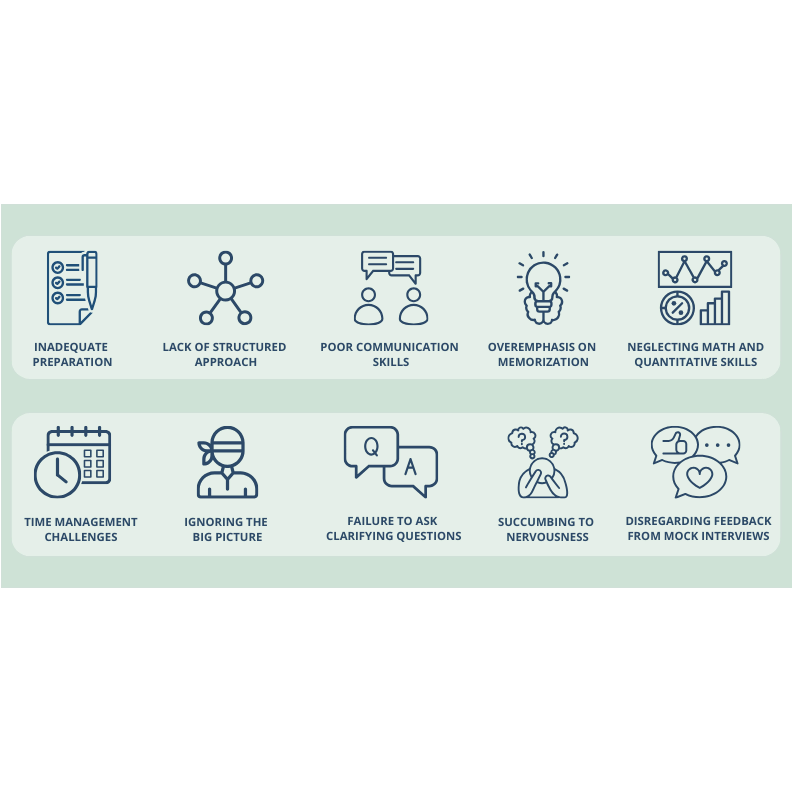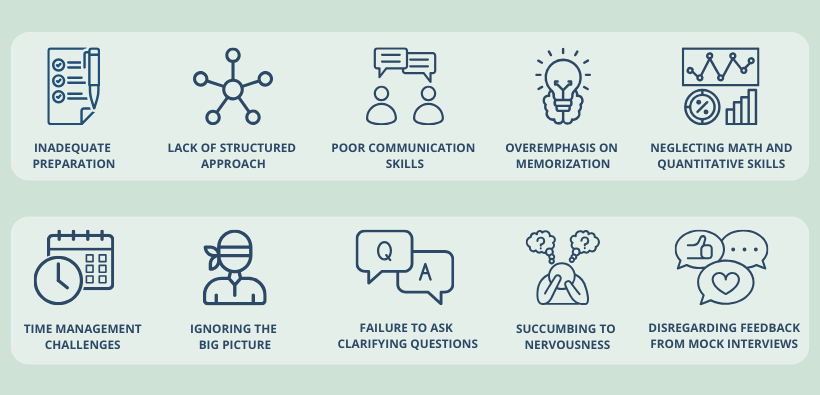Case interviews are a crucial part of the recruitment process for many consulting and business-related roles. They assess a candidate's problem-solving skills, analytical thinking and ability to communicate complex ideas effectively. However, despite their significance, many individuals find case interviews to be intimidating and challenging. Failure in case interviews can often be attributed to a combination of factors that go beyond simply lacking technical knowledge.
In this article, we will explore the top 10 reasons why people fail at case interviews. Furthermore, as we continue our journey toward mastery, we unveil the solutions that act as guiding stars through the complex terrain of case interviews.
1. Top 10 Reasons For Failure
Here are the top 10 reasons why the path to success in case interviews can often prove elusive. These pitfalls, while challenging, are not insurmountable. In fact, they serve as signposts pointing toward areas for growth and improvement. As we delve into each of these challenges, we'll also uncover practical solutions that can transform stumbling blocks into stepping stones on your journey to mastering case interviews.
Let's explore how to navigate these hurdles and emerge stronger, wiser and better equipped to conquer the world of case interviews.
2. How To Avoid The Pitfalls
In the intricate world of case interviews, avoiding pitfalls is a skill in itself - one that can spell the difference between success and faltering.
- Prioritize Preparation – Dedicate Ample Time to Studying and Practicing:
Invest significant time in understanding the case interview format and practicing with a variety of case scenarios. Utilize online resources, casebooks, and mock interviews to simulate real-life conditions. - Embrace Structured Thinking – Master Problem-Solving Frameworks:
Familiarize yourself with problem-solving frameworks like the Issue-Tree and Hypothesis-Driven Approach. Practice using these frameworks to dissect complex problems systematically. - Hone Communication Skills – Practice Clear and Concise Communication:
Record yourself solving cases or explaining concepts to improve articulation. Seek feedback from peers or mentors to refine your communication style, ensuring clarity and coherence. - Balance Memorization with Adaptability – Understand Concepts Behind Frameworks:
Rather than memorizing frameworks verbatim, focus on understanding their underlying concepts. This knowledge allows you to apply these frameworks flexibly to various scenarios. - Strengthen Quantitative Abilities – Brush Up on Math Skills:
Regularly practice mental math, data interpretation, and basic calculations. Utilize resources such as math practice books or online exercises to enhance your quantitative skills. - Master Time Management – Simulate Real-Time Conditions During Practice:
Use a timer during your practice sessions to mimic the time constraints of real case interviews. This practice will help you manage time effectively and prioritize tasks under pressure. - Think Holistically – Regularly Zoom Out to See the Bigger Picture:
Train yourself to periodically step back and evaluate the overarching business context. This practice enhances your ability to offer comprehensive and strategic recommendations. - Ask Smart Questions – Seek Clarifications Before Diving Into Analysis:
Develop a set of insightful questions to ask at the beginning of each case interview. These questions should clarify key details and guide your subsequent analysis. - Tame Nervousness – Employ Relaxation Techniques to Manage Anxiety:
Incorporate relaxation techniques such as deep breathing and mindfulness exercises into your routine. Practicing these techniques helps alleviate nervousness and keeps your mind focused. - Embrace Feedback – Incorporate Insights from Mock Interviews:
Engage in mock interviews with peers, mentors, or professional consultants. Analyze the feedback received and work on improving specific areas highlighted during these sessions.
3. Conclusion
In the realm of consulting and business-related roles, case interviews serve as pivotal gateways to one's career aspirations, evaluating problem-solving acumen, analytical thinking, and effective communication. However, these interviews can be daunting, and success often eludes candidates for reasons extending beyond mere technical knowledge.
In this article, we have presented the 10 most common reasons for unsuccessful case interviews, looking at each challenge as an opportunity for personal growth and development. From inadequate preparation to communication difficulties to the importance of adaptability, we offer you pragmatic solutions to turn these obstacles into opportunities that can lead you to case interview mastery.
By using these insights, you can envision yourself confidently navigating the complex terrain of case interviews and not only emerging successful, but also better prepared for the competitive consulting and business world. So take advantage of the moment, because your next case interview could be your path to achieving your ultimate career goals.




